Exploring High-Demand Careers in Criminal Investigation
Forensic science jobs are specialized positions that use scientific methods to analyze physical evidence for criminal investigations and legal proceedings. Here's a quick overview of the most common forensic science careers:
| Position | Average Salary | Minimum Education | Key Skills |
|---|---|---|---|
| Forensic Scientist | $64,940 | Bachelor's in science | Laboratory analysis, report writing |
| Crime Scene Investigator | $67,440 | Bachelor's in forensic science | Evidence collection, photography |
| Digital Forensic Examiner | $74,300 | Bachelor's in computer science | Data recovery, cybersecurity |
| Forensic Pathologist | $181,000+ | Medical degree + fellowship | Autopsy procedures, medical knowledge |
| Forensic Toxicologist | $72,720 | Bachelor's in chemistry | Chemical analysis, pharmacology |
The field of forensic science combines the precision of scientific methodology with the pursuit of justice. Whether examining DNA samples in a sterile laboratory or photographing blood spatter patterns at crime scenes, forensic professionals serve as the scientific backbone of our criminal justice system. With employment in this field projected to grow 14% from 2023 to 2033—much faster than the average for all occupations—these careers offer both stability and meaningful work.
Forensic science encompasses numerous specializations, each requiring specific training and expertise. From digital forensics experts who recover deleted files to forensic anthropologists who analyze skeletal remains, these professionals share a commitment to objectivity and attention to detail. The Harris County Institute of Forensic Sciences alone receives hundreds of applications monthly for various positions, highlighting the competitive nature of this field.
I'm Mortuary Cooler, a national-level supplier of mortuary equipment with extensive experience supporting forensic science jobs through the provision of specialized storage systems that maintain evidence integrity in medical examiner offices and crime labs across the country.
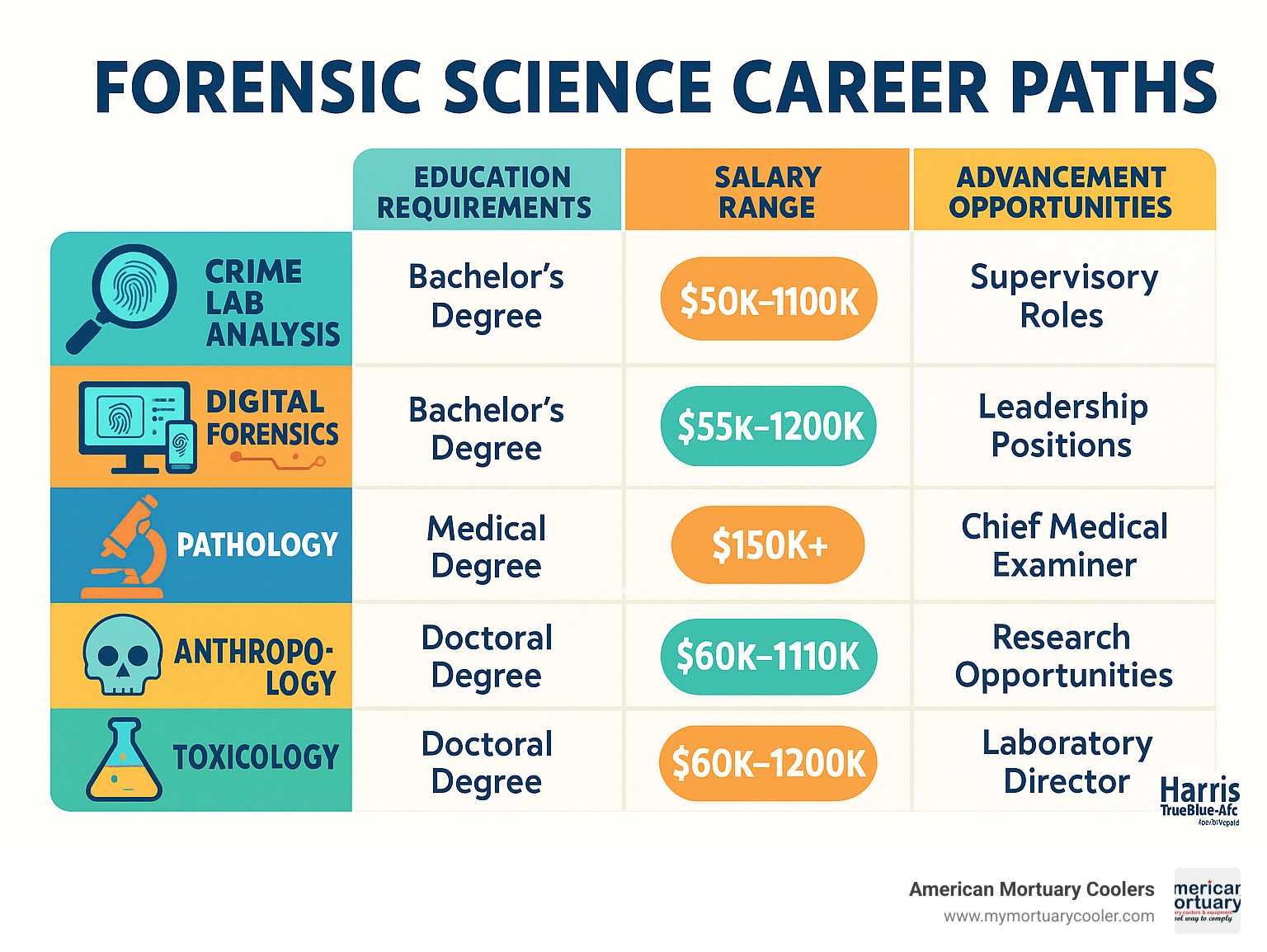
Forensic science jobs terms made easy:
Forensic Scientist (Crime Lab)
Behind every criminal case solved through scientific evidence, you'll find dedicated professionals working in controlled laboratory environments. These lab heroes—forensic scientists—transform tiny samples into powerful evidence that can make or break a case.
"The fate of the accused in court lies with the evidence we gather and analyze," shares a forensic scientist at Harris County Institute of Forensic Sciences. "Our work demands precision—there's simply no room for error when justice hangs in the balance."
Most forensic science jobs in the lab involve specialization in fascinating disciplines. DNA analysts extract and interpret genetic material that can place suspects at crime scenes with remarkable accuracy. Ballistics experts examine firearms and ammunition to determine whether a specific weapon was used in a crime. Those specializing in trace evidence analyze seemingly insignificant fibers or paint chips that often provide crucial links between suspects and crime scenes. Meanwhile, controlled substance analysts identify illegal drugs and determine their composition, supporting narcotics investigations.
What many people don't realize is how seriously forensic scientists take the chain of custody—that carefully documented trail of evidence from crime scene to courtroom. Labs accredited by the American Society of Crime Laboratory Directors (ASCLD) follow protocols that would impress even the most detail-oriented person, documenting every hand that touches each piece of evidence.
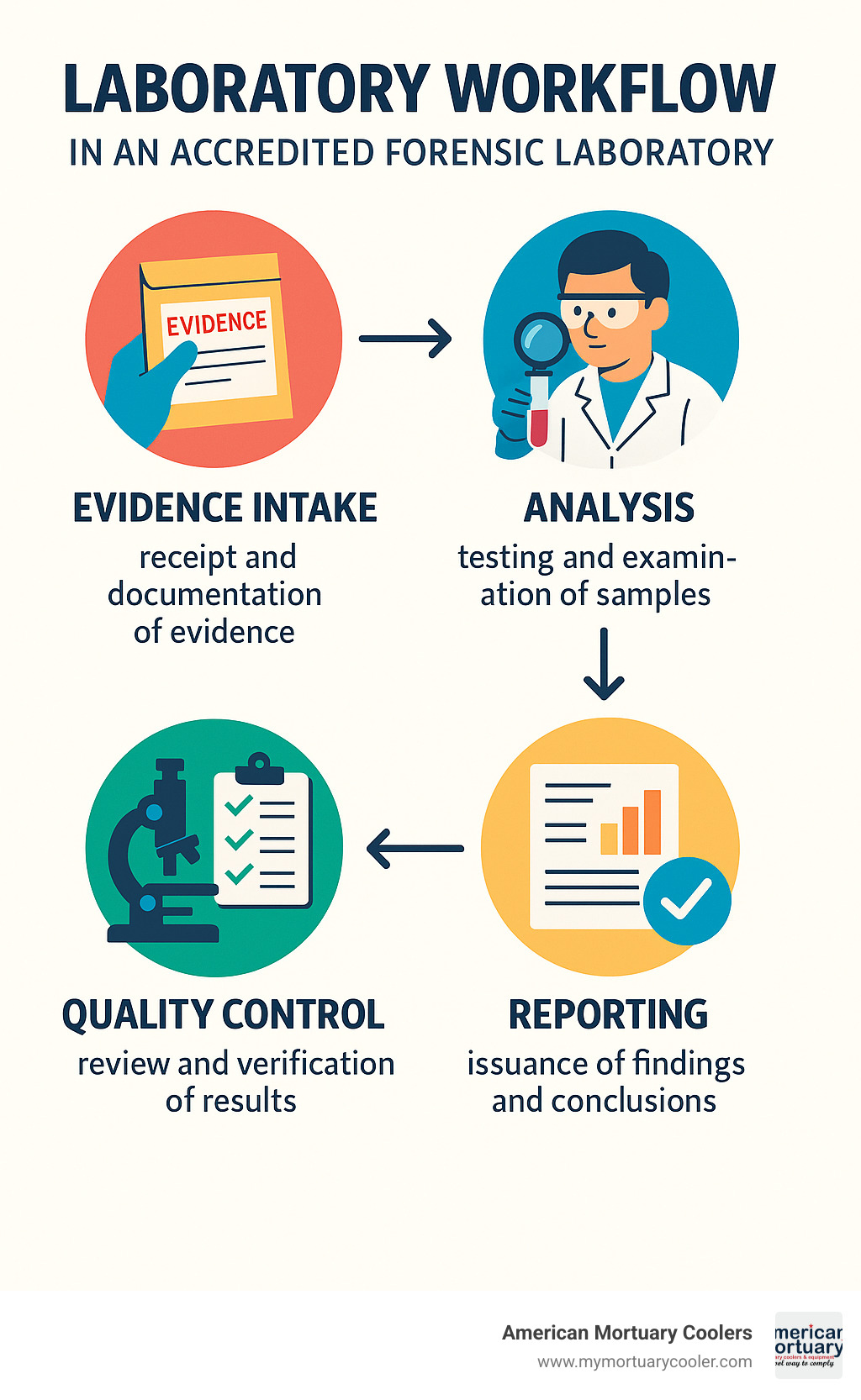
Essential Skills for Forensic Science Jobs
Success in the crime lab isn't just about scientific knowledge—it requires a unique blend of abilities that set these professionals apart.
Analytical thinking forms the foundation of good forensic work, allowing scientists to approach complex problems methodically and draw sound conclusions. This pairs with an almost superhuman attention to detail, as overlooking even the tiniest element could compromise an entire case.
"We're not just scientists—we're storytellers," explains a Harris County forensic scientist. "Our analyses help reconstruct what happened, and we must communicate those findings clearly, whether in written reports or on the witness stand."
Indeed, report writing skills are crucial, as these professionals must translate technical findings into language that attorneys, judges, and juries can understand. This ties directly to their role providing expert testimony, where they explain complex scientific concepts in accessible ways that support the judicial process.
Of course, strong scientific knowledge and proficiency with laboratory techniques form the technical backbone of these positions. Working with mass spectrometers, comparison microscopes, and DNA sequencers requires both education and hands-on experience—creating a career path that's as intellectually stimulating as it is important to society.
At American Mortuary Coolers, we're proud to support the forensic science community by providing the specialized storage systems that help maintain evidence integrity in medical examiner offices and crime labs nationwide.
Crime Scene Investigator (CSI)
Unlike their lab-based colleagues, Crime Scene Investigators work where the action happens – in the field, where evidence is still fresh and scenes remain untouched. These professionals are the crucial first link in the forensic chain, changing chaotic crime scenes into methodical investigations.
"Every crime scene tells a story," explains a veteran CSI with Harris County. "Our job is to read that story through the physical evidence left behind, preserving it so others can analyze and interpret what happened."
CSIs arrive at scenes day or night, in scorching heat or pouring rain – crime doesn't wait for convenient hours. Their work begins with securing the scene to prevent contamination that could compromise evidence. Using specialized photography techniques, they document everything from overall views to minute details before anything is touched.
The heart of their work involves bloodstain pattern analysis, where the size, shape, and distribution of blood can reveal crucial details about what transpired. They carefully collect biological samples, trace evidence, and potential weapons, all while maintaining strict chain-of-custody protocols.
The reality of CSI work differs dramatically from television portrayals. These professionals work demanding 24/7 shifts, often spending hours processing scenes in challenging conditions. The work requires both physical stamina and emotional resilience – processing violent crime scenes takes a psychological toll that CSIs must learn to manage.
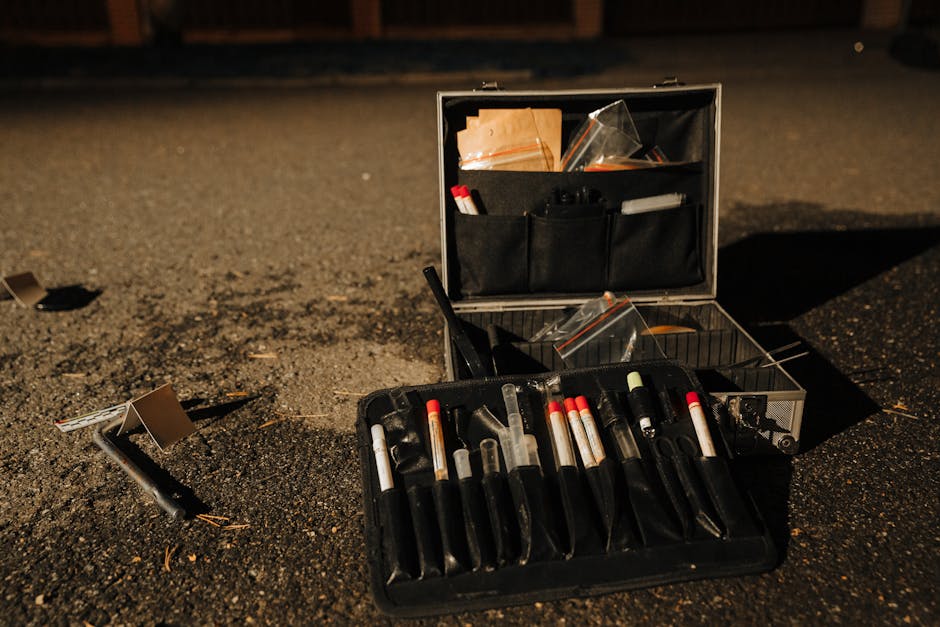
Scene reconstruction represents one of the most complex aspects of CSI work. By synthesizing evidence patterns, measurements, and witness statements, CSIs help investigators understand the sequence of events that occurred. Their detailed reports become the foundation upon which cases are built.
At American Mortuary Coolers, we recognize how critical proper evidence preservation is to successful investigations. Our cooling systems help crime labs maintain biological evidence at optimal temperatures, ensuring samples remain viable for laboratory analysis.
For those interested in exploring this field further, our guide on Exploring Essential Forensic Tools and Equipment provides a comprehensive look at the specialized tools these professionals rely on daily – from alternate light sources that reveal invisible evidence to specialized collection kits designed for specific evidence types.
Digital Forensic Examiner
Crime scenes don't just exist in physical spaces – they're often hidden in the digital field. Digital Forensic Examiners are the tech detectives who recover, analyze, and preserve electronic evidence that can make or break a case. These digital sleuths work their magic on computers, smartphones, networks, and cloud storage to uncover virtual breadcrumbs left behind by criminals.
"We provide the scientific bridge between digital devices and investigative teams," explains a Digital Forensic Examiner at the DEA. "When agents seize a laptop or phone, we're the ones who extract the stories those devices tell – often revealing crucial evidence that the suspect thought was long gone."
Behind their screens, these experts tackle challenging tasks like:
Recovering files that suspects believed were permanently deleted, using specialized recovery techniques that can resurrect digital ghosts. They extract critical data from smartphones – text messages, location history, photos with hidden metadata – that can place suspects at crime scenes or reveal criminal networks. When malware strikes or hackers breach systems, digital forensic experts trace the digital fingerprints to identify perpetrators.
Just as physical evidence requires a documented chain of custody, digital evidence demands what experts call a "chain of bits" – meticulous documentation showing exactly how digital evidence was collected, preserved, and analyzed without contamination.
The tools of this trade are highly specialized. Software like EnCase and Forensic Toolkit (FTK) allow examiners to create perfect "forensic images" – exact duplicates of storage media that preserve every digital artifact while leaving original evidence untouched. For mobile devices, tools like Cellebrite help access locked phones and extract their secrets.
As cybercrime continues its relentless rise, the demand for these specialists has surged. Most positions require advanced education – typically a master's or doctoral degree in computer science, information security, or related fields, plus specialized forensic training and IT experience.
For professionals seeking to stay current in this rapidly evolving field, the American Academy of Forensic Sciences (AAFS) offers valuable resources and Scientific research on digital evidence. The field demands constant learning, as new devices, operating systems, and encryption methods emerge almost daily.
At American Mortuary Coolers, we understand that proper preservation applies to both physical and digital evidence. While we specialize in temperature-controlled environments for biological evidence, we recognize that forensic science jobs across all specialties share a common mission: preserving crucial evidence that speaks truth in the pursuit of justice.
Forensic Pathologist
When most people think of forensic science jobs, they often picture the medical detectives they've seen on TV shows - those are forensic pathologists. These specialized physicians do much more than perform autopsies; they're the voice for those who can no longer speak for themselves.
Forensic pathologists combine medical expertise with investigative skill to determine how and why someone died. After completing medical school, they start on an additional 4-5 years of specialized training through a pathology residency and forensic pathology fellowship. This rigorous education prepares them for the challenges of death investigation.
"The body tells a story," explains a senior pathologist at Harris County Institute of Forensic Sciences. "Our job is to read that story carefully and translate it into findings that help bring closure to families and justice to victims."
On any given day, a forensic pathologist might:
- Conduct detailed autopsies to reveal hidden causes of death
- Distinguish between natural deaths and those resulting from homicide, suicide, or accident
- Draw blood and tissue samples for toxicology screening and DNA analysis
- Calculate time of death using body temperature, lividity, and decomposition stages
- Document injuries through photographs that may later become court evidence
- Decipher complex wound patterns to determine what weapons were used
- Testify as expert witnesses, explaining medical findings in terms juries can understand
The work is intellectually challenging and emotionally demanding, but also deeply meaningful. "If you enjoy working in a challenging and rewarding environment, the Harris County Institute of Forensic Sciences is the place to grow in your career," states their recruitment material. This meaning is reflected in compensation too - forensic pathologists typically earn starting salaries of $181,000 and up, acknowledging their specialized medical expertise and critical role in the justice system.
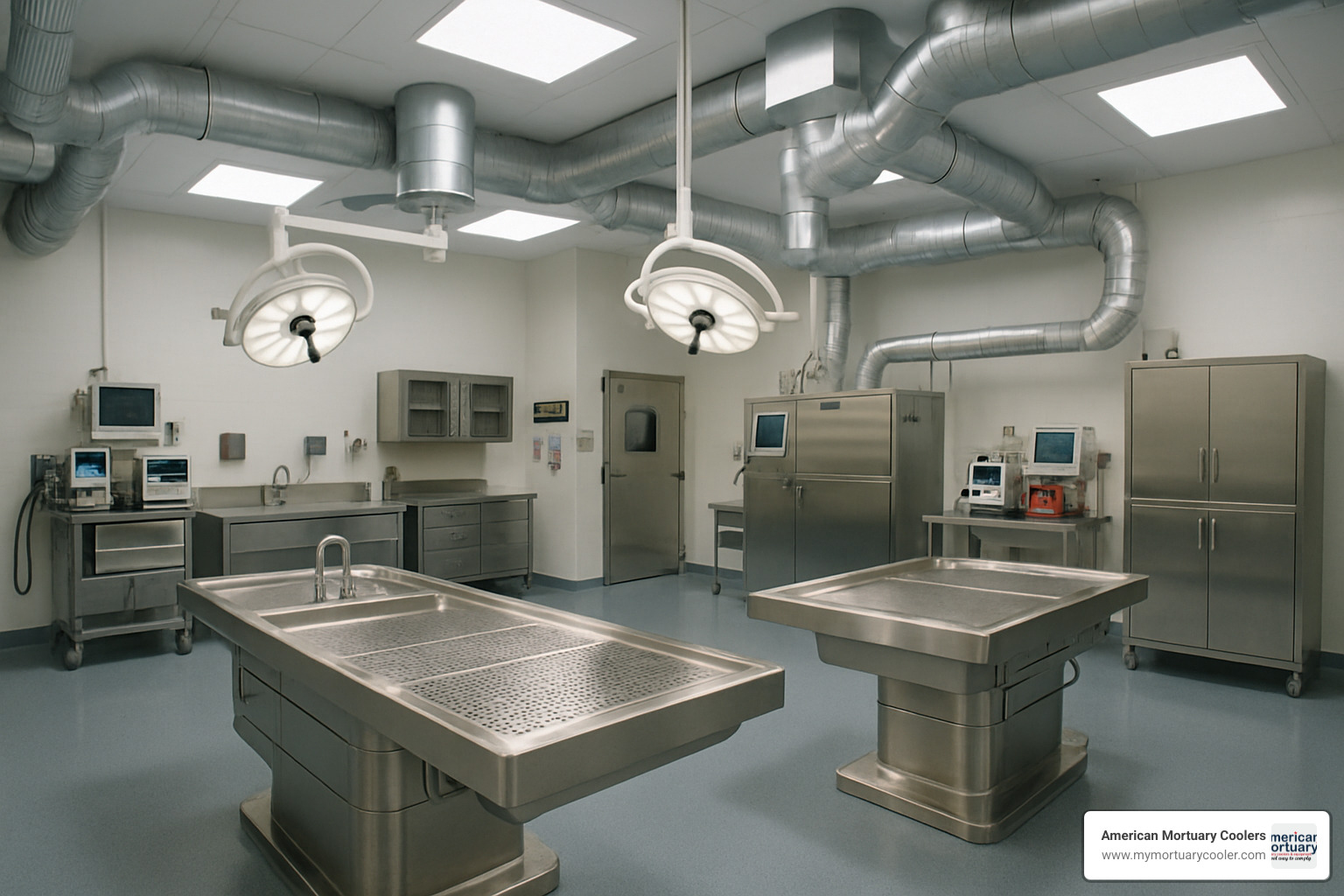
At American Mortuary Coolers, we've had the privilege of working alongside medical examiner offices nationwide. We understand that proper preservation is essential to forensic integrity, which is why we design custom cooling systems specifically for autopsy suites and morgue facilities. Our Tennessee-manufactured mortuary coolers are built with the exacting standards that forensic pathologists require, ensuring remains are properly preserved throughout the examination process.
These specialized physicians represent the intersection of medicine and justice - bringing scientific clarity to tragic circumstances and helping both legal systems and grieving families find the answers they need.
Forensic Toxicologist
When a mysterious death occurs or a driver is suspected of being impaired, forensic toxicologists step in as the chemical detectives of the justice system. These specialized scientists analyze biological samples—blood, urine, hair, and tissues—to uncover the secrets that substances leave behind in our bodies.
"Every sample tells a story," explains a senior toxicologist at a major crime lab. "Our job is to read that chemical narrative and translate it for investigators and courts."
Using cutting-edge analytical equipment like Liquid Chromatography-Mass Spectrometry (LC-MS/MS), these professionals can detect substances at incredibly tiny concentrations—sometimes just parts per billion. It's like finding a specific grain of sand on a beach, yet these minute traces can make all the difference in a case.
Forensic science jobs in toxicology require meticulous attention to detail. A forensic toxicologist might spend their morning running DUI panels to determine if a driver was impaired, then shift to analyzing tissues from an autopsy to help determine cause of death. The next day might bring a suspected poisoning case or a workplace drug testing challenge.
Behind the scenes, quality assurance and quality control (QA/QC) protocols form the backbone of toxicology work. Every test must stand up to rigorous scientific and legal scrutiny. A single mistake could compromise justice, so toxicologists develop validated testing methods, establish reference standards, and implement multiple controls with each test batch.
The field demands a solid foundation in chemistry and pharmacology. Understanding how drugs metabolize in the body—changing into different compounds over time—helps toxicologists interpret findings accurately. A substance detected in blood might tell one story, while the same case examined through hair analysis might reveal a completely different pattern of use.
At American Mortuary Coolers, we've worked with numerous medical examiner offices to design cooling systems that maintain the integrity of biological samples awaiting toxicological testing. Proper temperature control is crucial—even slight degradation can alter test results and potentially affect case outcomes.
The world of forensic toxicology never stands still. As new designer drugs emerge and testing technologies advance, toxicologists must continuously update their knowledge and techniques. Many specialize in particular areas, becoming experts in postmortem analysis, human performance toxicology for DUI cases, or the detection of specific substance classes.
For those considering this career path, the rewards extend beyond the fascinating science—your work directly contributes to justice, public safety, and occasionally, bringing closure to families seeking answers about a loved one's death.
Latent Fingerprint Examiner
The art and science of fingerprint analysis stands as one of forensic science's most trusted identification methods. Behind those swirling patterns that make each of us unique are the dedicated professionals who bring them to light – Latent Fingerprint Examiners.
These specialists are the pattern detectives of the forensic world, with a keen eye for the tiniest details that can connect a person to a crime scene. Their work feels almost magical – revealing invisible fingerprints left behind on surfaces and changing them into concrete evidence that can solve cases.
"Every fingerprint tells a story," explains a veteran examiner at Harris County. "Our job is to listen carefully to what those ridge patterns are saying about who touched what and when."
The DEA sets high standards for these positions, requiring "certification by the International Association for Identification (IAI) as a Certified Latent Print Examiner dated within five years of application" for senior-level roles. This certification represents the gold standard in fingerprint analysis expertise.
Daily work for these examiners involves a fascinating mix of chemistry, photography, and analytical skills. They use special powders, chemicals, and lighting techniques to make invisible fingerprints visible on various surfaces. Once revealed, these prints undergo careful analysis using the ACE-V methodology (Analysis, Comparison, Evaluation, and Verification) – a systematic approach that ensures accuracy and reliability.
The real magic happens when examiners analyze the ridge minutiae – those tiny details like ridge endings, splits, dots, and islands that make each fingerprint unique. By comparing these features between unknown prints and known standards, examiners can establish identity with remarkable confidence.
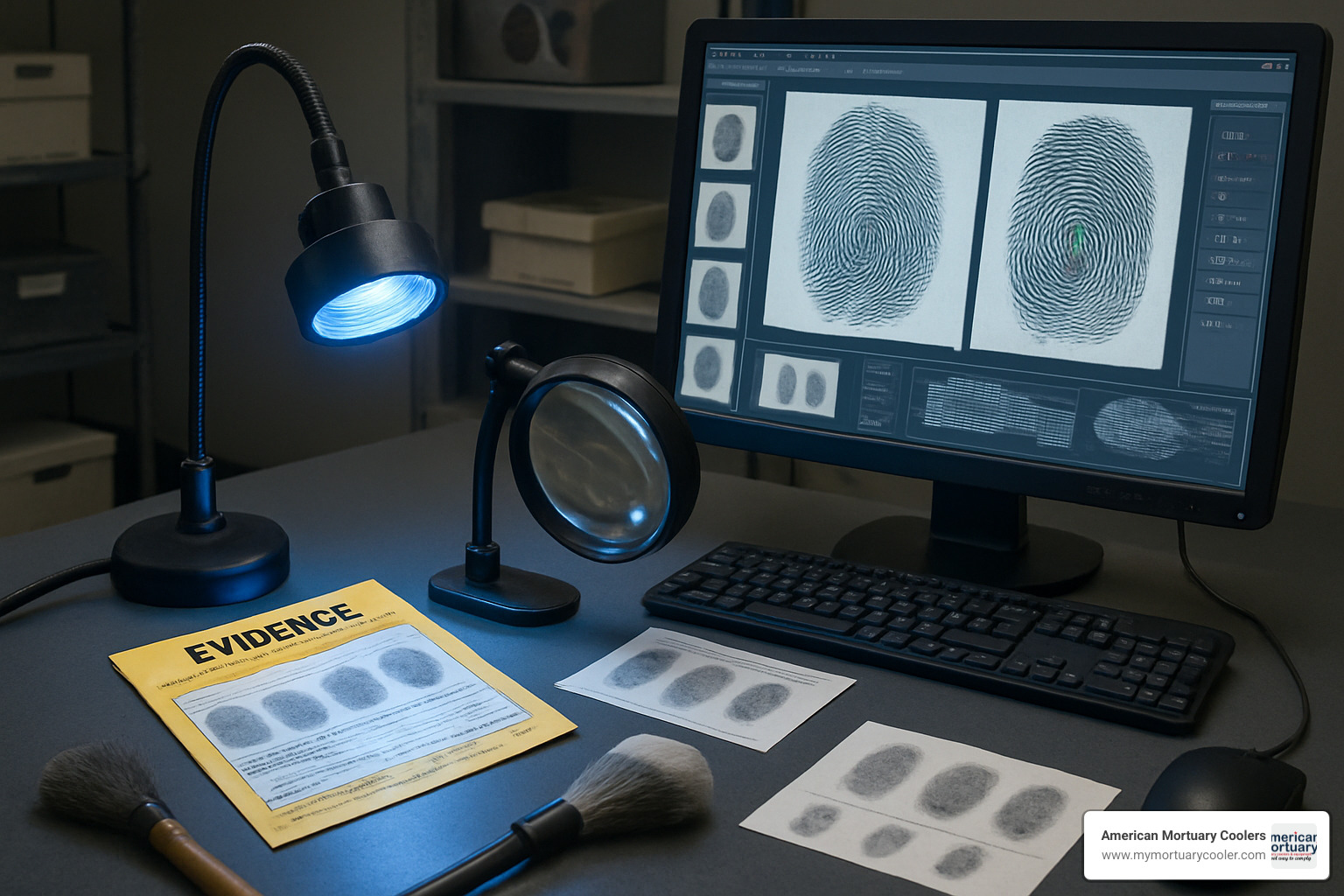
Technology has revolutionized this field with the introduction of AFIS (Automated Fingerprint Identification System), which can search millions of prints in seconds to generate potential matches. However, the human examiner's expertise remains irreplaceable for making final determinations and testifying in court about their findings.
When these experts take the witness stand, they bring the weight of science and their professional judgment to bear, often providing crucial testimony that can make or break a case. Their ability to explain complex technical concepts to judges and juries is just as important as their analytical skills.
At American Mortuary Coolers, we understand how critical proper evidence preservation is to the fingerprint examination process. Our custom cooling systems help forensic facilities maintain optimal temperatures for evidence storage, ensuring that fingerprints and other biological evidence remain viable for analysis. The right environmental conditions can make all the difference in preserving those fragile, invisible impressions until they can be processed by these skilled examiners.
For those considering this career path, the journey typically begins with a strong foundation in forensic science or a related field, followed by specialized training and mentorship under experienced examiners. The reward? Being part of a profession that has been solving crimes through the science of identity for more than a century.
Forensic Anthropologist
When human remains are finded—whether in a shallow grave, disaster site, or archaeological dig—forensic anthropologists apply their expertise in human skeletal analysis to extract vital information. These specialists work primarily with skeletal remains to determine identity, trauma patterns, and time since death.
Forensic anthropologists typically hold advanced degrees in physical or biological anthropology with specialized training in osteology (the study of bones). Their unique skill set allows them to:
- Determine if remains are human or animal
- Establish a biological profile including age, sex, ancestry, and stature
- Identify unique skeletal features that may aid in identification
- Analyze trauma patterns to distinguish perimortem (at or near time of death) from postmortem damage
- Estimate the postmortem interval (time since death)
- Assist with excavation and recovery of remains from crime scenes or mass disasters
- Collaborate with forensic odontologists, pathologists, and other specialists
"Bones tell stories that flesh cannot," explains a leading forensic anthropologist. "Long after soft tissues have decomposed, the skeleton preserves evidence of identity, trauma, and life history."
These specialists often work with law enforcement on cold cases, unidentified remains, and mass fatality incidents. They may be employed by medical examiner offices, universities, or as independent consultants who are called in when specialized expertise is needed.
For those interested in this fascinating field, we recommend our comprehensive article on Bones Unearth Truth, which explores the science and methodologies used by forensic anthropologists.
At American Mortuary Coolers, we provide specialized storage solutions that support the work of forensic anthropologists in medical examiner offices and university research facilities across the country. Our custom-designed coolers help preserve remains during the examination and analysis process.
Forensic Odontologist
When traditional identification methods fall short, forensic odontologists step in with their specialized dental expertise. These professionals—typically practicing dentists with DDS or DMD degrees—have additional training that allows them to apply dental science to legal matters in fascinating ways.
"Teeth are remarkably resilient," explains a veteran forensic odontologist. "They can withstand conditions that destroy other identifying features, making dental identification invaluable when dealing with severely decomposed or damaged remains."
The work of these dental detectives extends far beyond simple identification. On any given day, a forensic odontologist might be:
Comparing dental records to identify human remains when fingerprints or DNA aren't viable options. By carefully examining unique dental characteristics—fillings, crowns, missing teeth, and anatomical features—they can establish identity with remarkable accuracy.
Analyzing radiographs (dental X-rays) to compare postmortem findings with antemortem dental records, often revealing distinctive patterns as unique as fingerprints.
Documenting bite mark evidence in criminal cases—though this practice has faced increased scientific scrutiny in recent years due to reliability concerns.
Determining dental age in cases involving minors or unidentified remains by examining tooth development patterns.
Participating in mass disaster response teams where rapid identification of multiple victims is critical. Their expertise proved invaluable following events like the 9/11 attacks, Hurricane Katrina, and major transportation accidents.
Evaluating cases of suspected abuse by documenting and analyzing dental trauma patterns that might indicate maltreatment.
What makes dental identification so powerful is the durability of dental evidence. Teeth often remain intact long after other identifying features have been compromised by time, fire, or decomposition. The comparison process involves methodical documentation of dental characteristics and careful matching with existing records.
At American Mortuary Coolers, we understand the critical importance of proper preservation during forensic examinations. Our Tennessee-manufactured cooling systems help maintain optimal conditions for remains during the identification process, supporting the vital work of forensic odontologists across the country. By providing reliable temperature control, we help ensure that valuable evidence remains preserved until these dental experts can complete their crucial investigations.
Forensic Accountant
Not all forensic science jobs involve blood spatter or DNA analysis. Meet the financial detectives of the forensic world: forensic accountants. These specialized professionals follow the money trail with the same dedication that CSIs follow footprints, uncovering financial crimes that might otherwise remain hidden in spreadsheets and bank statements.
Think of forensic accountants as financial archaeologists, carefully excavating through layers of transactions to reveal the truth beneath. According to research, "Forensic accountants at the FBI track money laundering by terrorists, spies, and criminals" and receive specialized training at the FBI Academy in Quantico, Virginia to sharpen these unique skills.
When a company finds funds missing, when attorneys need to calculate damages in litigation, or when investigators suspect complex financial fraud, forensic accountants step in. They analyze financial records with a skeptical eye, tracing money through mazes of transactions and shell companies. They're experts at reconstructing financial records even when documentation has conveniently "disappeared," and they have a knack for finding assets that others have tried to hide.
What makes this work particularly challenging is that financial criminals are constantly evolving their techniques. Today's forensic accountants need strong technological skills to match, using sophisticated data analytics to identify patterns that might signal fraud amid thousands or even millions of transactions.
Most professionals in this field start with accounting degrees and CPA (Certified Public Accountant) credentials, often adding specialized certifications like Certified Fraud Examiner (CFE) or Certified in Financial Forensics (CFF). But technical knowledge alone isn't enough—the best forensic accountants combine accounting expertise with investigative instincts and the ability to communicate complex financial concepts clearly in court.
| Traditional Auditor | Forensic Accountant |
|---|---|
| Focuses on compliance and accuracy | Focuses on detecting fraud and financial crimes |
| Works with cooperative clients | May work with hostile or deceptive subjects |
| Follows standard audit procedures | Uses investigative techniques and specialized tools |
| Reports to company management | May prepare evidence for legal proceedings |
| Examines samples of transactions | Often performs 100% review of suspicious areas |
| Limited concern with intent | Focuses on intent and motives behind transactions |
The work can be incredibly rewarding. While a traditional accountant might prevent financial problems, forensic accountants help deliver justice when financial crimes have already occurred. They've helped recover millions for fraud victims, provided evidence that has put financial criminals behind bars, and even supported international efforts against terrorism financing.
At American Mortuary Coolers, we primarily support the physical forensic sciences with our specialized cooling equipment. Yet we deeply respect the crucial role that all forensic specialists play in the justice system—including these financial investigators who prove that sometimes, the most important evidence isn't found at the crime scene but in the bank records.
Forensic Psychology Specialist
Imagine being able to dive into the criminal mind, uncovering motives and assessing mental states that help solve cases and ensure justice. That's the fascinating world of forensic psychology, where the science of human behavior meets the legal system.
Forensic psychologists are the mental health experts who help courts understand the psychological factors at play in criminal cases. With doctoral degrees (Ph.D. or Psy.D.) in clinical or counseling psychology, these specialists have additional training in how psychological principles apply to legal questions.
"I feel that I'm playing for the right team," says Camila, an FBI forensic examiner quoted in our research. Her words capture why many enter this field—the meaningful impact of ensuring fair legal outcomes while protecting public safety.
These specialists wear many hats in the justice system. They conduct competency evaluations to determine if defendants understand the charges against them and can assist in their own defense. They assess criminal responsibility by examining a defendant's mental state at the time of an offense. Their expertise in risk assessment helps courts make informed decisions about sentencing and release conditions.
When investigations hit roadblocks, forensic psychologists may develop offender profiles that help narrow suspect pools based on behavioral evidence. They provide courts with treatment recommendations that balance rehabilitation needs with public safety concerns. In family court, they evaluate parents and children in custody disputes, always keeping the child's best interests at the forefront.
One of their most visible roles is serving as expert witnesses, translating complex psychological concepts into language judges and juries can understand. This requires not just expertise but excellent communication skills and the ability to stay calm under cross-examination.
The ethical challenges in this field can't be overstated. Forensic psychologists must maintain objectivity while working in an adversarial legal system. They need clear boundaries between their roles as evaluators versus treatment providers. Their assessments can literally change lives, making professional integrity essential.
At American Mortuary Coolers, we understand the forensic field's demands for precision and integrity. While our Tennessee-based company focuses on providing mortuary storage solutions to maintain evidence integrity, we appreciate the crucial role that all forensic specialists—including psychologists—play in the justice system.
For readers fascinated by this intersection of psychology and law, we recommend our in-depth article on The Mind in the Courtroom. This comprehensive guide explores how forensic psychology shapes our justice system, from criminal investigations to courtroom proceedings.
The field continues to evolve as research advances our understanding of human behavior, creating exciting opportunities for those drawn to both psychology and justice. For those with the right combination of analytical thinking, emotional resilience, and ethical commitment, forensic psychology offers a deeply rewarding career path.
How to Land Forensic Science Jobs at Harris County Institute of Forensic Sciences
The Harris County Institute of Forensic Sciences stands as one of Texas's most prestigious employers for forensic science jobs, attracting hundreds of eager applicants each month. If you're dreaming of joining their team of dedicated professionals, I'll walk you through their application process with some insider tips.
The Institute requires all applications to be submitted through the official Harris County online system—no exceptions. Here's your roadmap to navigating the process successfully:
First, visit the Harris County Office of Human Resource and Risk Management Careers page. Look for the "Available Job Opportunities" section and filter specifically for "Institute of Forensic Sciences" positions. Hit that GO button to see all current openings that match your search. Take time to click through each position title—this reveals detailed descriptions and specific requirements that might not be apparent from the title alone.
A resume by itself won't cut it here. You'll need to complete the full online application, which you can access through their current opportunities Searchcurrent opportunitiesand apply online portal.
Application Checklist for Forensic Science Jobs
Success in landing forensic science jobs at Harris County starts with a meticulous application. Think of your application as your first case—attention to detail matters!
The hiring team emphasizes completing every single field in the application form. Incomplete applications typically don't make it past the initial screening. Be prepared to attach certified copies of your college transcripts if the position requires them, along with your resume and copies of any relevant licenses or certifications you hold.
"Qualifications vary dramatically between positions," explains one Harris County hiring manager I spoke with. "Applicants absolutely must read job postings carefully and provide proof of all required credentials—otherwise, their application simply won't be considered."
One practical tip: The application system automatically times out after 30 minutes of inactivity. I recommend preparing all your materials in advance so you don't lose your work halfway through the process.
Pre-Employment Screening
If your application catches the hiring team's eye, prepare for the next phase of vetting. Harris County conducts thorough criminal background checks for all potential hires. You'll also face drug screening after receiving a conditional offer.
Depending on the specific forensic science job you're pursuing, you might encounter position-specific testing designed to evaluate your technical knowledge and skills. The Institute will also verify your education credentials and work history, so accuracy on your application is essential.
These screenings aren't just formalities—they help maintain the Institute's reputation for integrity and excellence in forensic services. Every offer of employment remains contingent on successfully clearing these problems.
Benefits & Growth Path
The rewards of securing a position at the Harris County Institute extend beyond the satisfaction of meaningful work. Employees enjoy a comprehensive benefits package including medical, dental, and vision coverage, plus life insurance and long-term disability protection.
Your future financial security gets a boost through their retirement plan administered by the Texas County and District Retirement System (TCDRS). But perhaps most valuable is the professional growth opportunity—working alongside some of forensic science's most experienced practitioners creates natural mentorship opportunities that can accelerate your career development.
As the Institute itself describes, it offers "a challenging and rewarding environment" where you'll be "encouraged to learn, nurture and explore new ideas, methods, and technologies." For passionate forensic professionals, this combination of stability and innovation creates an ideal career home.
Staying Updated on Forensic Science Jobs
After submitting your application, you won't be left wondering about its status. The system sends automated email updates when your application moves to review, passes to hiring managers, or earns you an interview invitation.
For the detail-oriented (a valuable trait in forensics!), you can also check your application status directly through the online portal. Harris County provides a comprehensive Applicant Guide with additional guidance that I recommend reviewing before you apply.
At American Mortuary Coolers, we've had the privilege of working with prestigious institutions like the Harris County Institute of Forensic Sciences, providing custom mortuary storage solutions that meet their exacting specifications. Our Tennessee-built coolers are delivered nationwide, supporting the critical work of medical examiner offices and crime laboratories across the country.
Frequently Asked Questions about Forensic Science Careers
What degree do I need to start in forensic science jobs?
Navigating the educational requirements for forensic science jobs can feel like solving a puzzle itself! Different positions need different credentials, but I'm happy to break it down for you.
If you're eyeing a laboratory position, you'll typically need a bachelor's degree in biology, chemistry, or forensic science. These roles require a solid foundation in scientific principles and laboratory techniques. For Crime Scene Investigators, some agencies accept candidates with associate's degrees in criminal justice or forensic science, though I've noticed more departments now prefer candidates with full bachelor's degrees.
Digital forensics is a whole different ballgame. Computer science or related degrees are essential, and for senior positions, master's or doctoral-level education gives you a significant edge. As technology evolves, so do the educational expectations in this field.
For those dreaming of becoming a Forensic Pathologist, prepare for an extended educational journey—medical school, followed by a pathology residency, and then a specialized forensic pathology fellowship. It's demanding but incredibly rewarding work.
The Bureau of Labor Statistics confirms what we see in the field: "Forensic science technicians typically need a bachelor's degree in a natural science, such as chemistry or biology, or in forensic science." While some positions might accept an associate's degree combined with substantial hands-on experience, higher education opens more doors in this competitive field.
How competitive are forensic science jobs at Harris County?
Let's be honest—landing forensic science jobs at the Harris County Institute of Forensic Sciences isn't easy. These positions attract hundreds of applicants monthly, reflecting both their desirability and limited availability.
To stand out in this competitive landscape, you'll want to ensure your education precisely matches what they're looking for. Any internships, volunteer work, or practical experience can make your application shine. If the job posting mentions certifications, do your best to obtain them before applying. Strong communication skills are also crucial—after all, even the most brilliant scientific findings need to be clearly explained.
As one Harris County hiring manager candidly shared with me, "Hiring managers review all applications and select the best qualified" for interviews. This underscores how important it is to present your qualifications clearly and completely. Don't be modest—this is the time to showcase your relevant skills and experiences.
Do I need certification before applying?
The certification question often causes confusion, so I'm glad you asked! The requirements vary significantly depending on which forensic science job you're pursuing.
For entry-level Forensic Scientist positions, certification is typically not a must-have, though it certainly becomes more important as you advance. Fingerprint Examiners, especially in senior roles, increasingly need that IAI certification. If you're heading into forensic accounting, credentials like CPA, CFE, or CFF will dramatically strengthen your application.
Toxicologists benefit from certification by the American Board of Forensic Toxicology, while Crime Scene Investigators find certification through organizations like the IAI gives them a competitive edge.
A perfect example comes from the DEA, where "Fingerprint Specialists at GS-12 require a current IAI Certified Latent Print Examiner certification." This illustrates how certification becomes increasingly important as you climb the career ladder.
Even when a certification isn't explicitly required, having one demonstrates your commitment and professionalism. In a field where attention to detail and adherence to standards are paramount, these credentials can be the difference between your application landing in the interview pile or the "maybe next time" folder.
At American Mortuary Coolers, we work alongside forensic professionals daily, providing the specialized storage equipment that helps preserve evidence integrity. While we focus on the equipment side, we've gained valuable insights into what makes forensic professionals successful in their careers—and proper credentials are definitely part of that equation.
Conclusion
The world of forensic science jobs offers an incredible mix of career paths for those drawn to the powerful intersection of scientific inquiry and justice. From the precision of laboratory analysis to the methodical documentation at crime scenes, these careers share a noble purpose: revealing truth through careful, scientific examination of evidence.
The future looks bright for forensic professionals. With employment projected to grow 14% from 2023 to 2033—significantly outpacing average job growth—qualified candidates will find opportunities spanning both public and private sectors. Success in this field comes to those who blend scientific expertise with eagle-eyed attention to detail, sharp critical thinking, and the ability to communicate complex findings clearly.
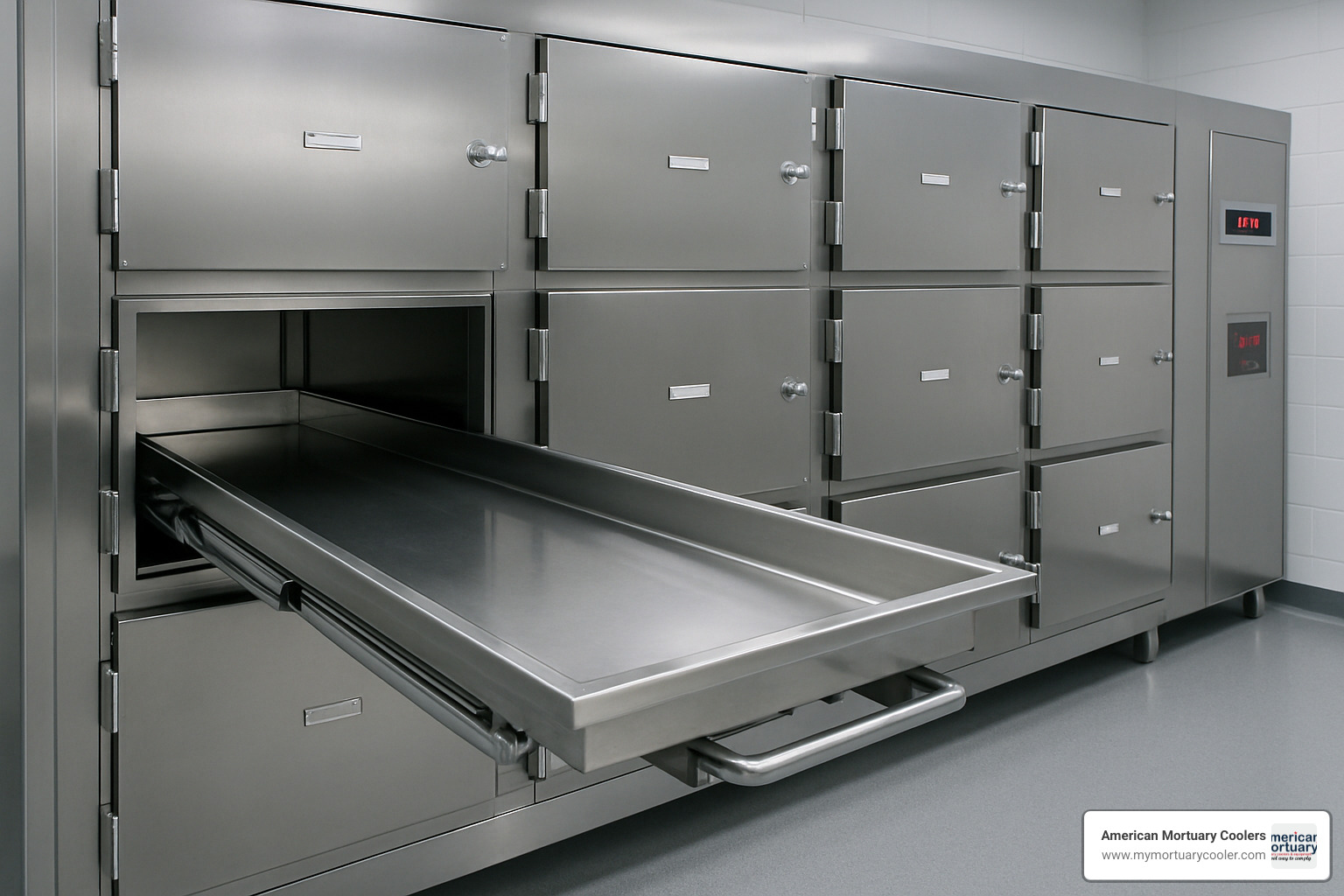
Here at American Mortuary Coolers, we take pride in supporting the forensic community through our specialized storage solutions that help maintain evidence integrity. Our custom-designed mortuary coolers—crafted with care in Tennessee and delivered to your doorstep nationwide—serve medical examiner offices, crime laboratories, and forensic facilities across the country in meeting the highest standards of evidence preservation.
From our bases in Johnson City, Atlanta, Chicago, and other major cities, we deliver durable, custom cooling solutions throughout the continental United States. We've taken the time to understand the unique requirements of forensic science facilities, designing our equipment to address the specific needs of professionals in this vital field.
For those beginning or advancing their forensic careers, proper evidence handling and storage form the bedrock of case integrity. The right equipment isn't just convenient—justice being served. Learn more about how appropriate mortuary equipment supports crucial forensic work by visiting More info about mortuary coolers.
Whether you're taking your first steps into forensic science or looking to climb higher in your career, this field rewards you with intellectually stimulating work that makes a real difference in people's lives. By applying scientific principles to legal questions, you'll help ensure that justice rests on the solid foundation of objective evidence rather than speculation or circumstance.



















